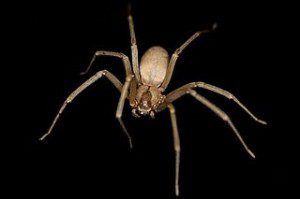A few weeks ago, I went on a business trip. This was the first time that my husband and four year old had any kind of long stretch without me. I was nervous, to be sure. However, the one thing I wasn’t expecting was a call at midnight on the second night of my trip, informing me that they were on their way to the ER. Lily had been outside playing on Sunday and said she’d gotten a bug bite. She continued playing, and my husband (naturally) thought nothing of it. However, by the next night, the affected area was red, swollen, hard, and hot to the touch. She said it didn’t itch, but that it hurt. My husband’s cautiousness paid off as she ended up being treated for a brown recluse spider bite. The ER doctor said he caught it very early.
Because of our experience, I wanted to take moment to share these tips on how to stay safe:
1. There is a huge difference between a brown recluse and a garden spider. Brown recluse spiders have a dark violin shape on the body, with the neck of the violin pointing away from the head. The body is about 3/8”-1/2” in length, and both the body and legs will be uniform in color. You will never see a multi-colored brown recluse. Additionally, brown recluse spiders have six eyes (not eight), and the three pairs of eyes are arranged in a semi-circle.
2. Brown recluse spiders hide. They make small webs behind or under things and will never be out in the open. They LOVE cardboard and wood. If you’re going to store things, be sure to use plastic totes with clip on lids, and dispose of cardboard instead of letting it stack up. Wear long sleeves tucked into gloves for any work in dark, cluttered places (sheds, garages, attics), and never stick your hands into any dark spaces you can’t see in clearly. These spiders do not bite unless provoked, but keep in mind that if you disturb them in “their” space, they will be provoked.
3. Spiders are hard to kill using sprays because they do not drag their bodies on the ground through the poison like other bugs. Therefore, glue traps that catch them are more effective.
4. Peppermint oil is a great spider deterrent. Mix 20-30 drops of peppermint oil with water in a spray bottle and spray it around all doors and windows. This won’t kill spiders, but the peppermint oil aggravates feelers on their legs, stopping them from crossing into your house.
5. If you or someone you know has been bitten, you should seek medical attention. The area will get hard and hot, and after a few days, lines will appear beneath the skin which indicate that the skin is getting infected. The more quickly that treatment is received, the less treatment will be needed. In medical situations, it is always better to be safe than sorry.
In the days before and after their ER visit, we saw news stories and so many Facebook posts we lost count of people who had run-ins with brown recluse spiders. The doctor said that the number of spider bites has increased drastically this year, due in part to a wet spring and mild summer. This was a scary experience for us, but—thankfully—Lily is fine and didn’t require any treatment other than a round of antibiotics and some Benadryl. Had we waited, this may have been much worse.
Stay safe out there, friends!


















